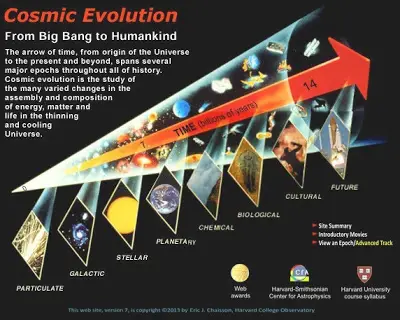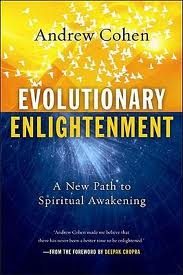TRANSLATE THIS ARTICLE
Integral World: Exploring Theories of Everything
An independent forum for a critical discussion of the integral philosophy of Ken Wilber
SEE MORE ESSAYS WRITTEN BY FRANK VISSER
Evolutionary
Endarkenment
Review of Andrew Cohen's
"Evolutionary Enlightenment"
Frank Visser
A spiritual approach to these topics does not enlighten us, on the contrary, it "endarkens" us, if you allow me this neologism.
In his popular book Evolutionary Enlightenment: A New Path to Spiritual Awakening (2011), Andrew Cohen delineates his new view of spirituality. In this view it is no longer a matter of transcending the world, but of transforming it. Specifically, this will happen by aligning oneself with the "evolutionary impulse" Cohen sees at work in the Universe at large, culminating in self-conscious human beings. By aligning oneself in this way, one can transcend the ego—which Cohen sees as the ultimate goal of all spirituality.
The book received impressive praise from various corners. Ken Wilber called it "truly one of the most significant books on spirituality written in de postmodern world". Deepak Chopra opines: "Andrew has brought together ancient wisdom traditions, modern cosmology, and a knowledge of evolution to give us a contemporary understanding of the nature of enlightenment. I think he is one of the most important teachers of our time." Says the publisher, summarizing it nicely: THE NEW SPIRITUALITY IS ALL ABOUT EVOLUTION.
Instead of paraphrasing the content of this book, I prefer to let Cohen explain it in his own words, in this series of YouTube videos:
Says Wikipedia of this "evolutionary" approach to spirituality:
Evolutionary Enlightenment is a philosophy that mixes teachings about Enlightenment from Eastern traditions with a Western scientific understanding of evolution.
So the basic idea is this—and I am paraphrasing now—from the Big Bang onwards to the present day, cosmic evolution has shown to be a process of the emergence of various new and unforeseen dimensions. First of matter, then of life, at least on our planet Earth, and finally of human consciousness and culture. "Evolution has become conscious of itself" is the oft-repeated slogan in these circles.
In this "evolutionary" philosophy, this whole process has been guided and energized by the "evolutionary impulse", which is also working in each of us individually. By consciously realizing that we can align ourselves with this truly cosmic impulse, we break out of the confines of our petty individual minds, and expand our consciousness to cosmic dimensions. This is presented as a modern-day spirituality that honors "a Western scientific understanding of evolution".
But does it? Really? Seriously?
In my opinion, and this will not come as a big surprise to readers of my essays on Integral World, this is a case of the "evolution religion", the attempt to use evolutionary metaphors for spiritual transformation, with often damaging consequences. Unfortunately, no evolutionary scientists today will try to explain—or rather, not explain—the emergence of matter, life and mind with the help of this hypothesis of an "evolutionary impulse".
For that would be the end of all explanation.
Think about it. How did matter arise? Oh, that's because of the evolutionary impulse. How did life arise? Ditto. How did... oh, never mind. Everything under the sun—from sub-atomic particles to galaxies, from large gaseous planets to life-friendly planets such as the Earth, or from chemical compounds indispensible for life to self-consciousness—is explained away by saying that it was the evolutionary impulse which created all this and more.
Remember how Ken Wilber, the co-originator of this evolutionary spirituality notion, tried to tie the genesis of the heavy elements of matter to his favorite notion of Spirit or Eros, creating a misplaced atmosphere of mystery and wonder around it?:
And so we started to get Hydrogen, and Helium and Oxygen and Nitrogen, and Potassium and Sodium and so on, starting to populate the universe. And this in itself is really extraordinary, given that none of this really existed with the Big Bang.
And yet the drive, that fundamental drive to creativity—it has been given many names, including self-organisation and Eros—but this Eros has this extraordinary capacity to fundamentally govern this "creative advance into novelty".
No attempt at a real explanation is made—it isn't even tried.
-0-0-0-
In Epic of Evolution: Seven Ages of the Cosmos (2005), astronomer and "Big Historian" Eric Chaisson explains in close to 500 pages, this whole process from the Big Bang up to human culture. At no point in his story does he cheat by invoking mysterious forces or impulses that supposedly explain what cannot be explained in a naturalistic way.
 Cosmic Evolution (Eric Chaisson)
Cosmic Evolution (Eric Chaisson)
(www.cfa.harvard.edu/~ejchaisson/)
True, not everything is known or understood yet by science of this vast proces—how could it?—but the spirit of investigation is kept alive and results are streaming in every day. A spiritual interpretation forestalls any further investigation, and is immune to rejection by stubborn facts.
As noted before in my essay "Integral Theory and the 'Big History' Approach", Chaisson has elucidated his ideas further on a magnificent website called "Cosmic Evolution" (another, more technical book on the same subject by Chaisson is called Cosmic Evolution).
The point I would like to make is: Cohen and like-minded authors (Ken Wilber, Ervin Lazlo, Barbara Marx Hubbard, Carter Phipps, Steve McIntosh et al.) give a romantic reading of the scientific story of the cosmos, which gives us no insight whatsoever.
Ironically, this is usually done to give transcendental meaning to the supposedly meaningless approach of science. But the "meaning" added by this manoeuver pales compared to the depth of insight provided by true scientific explanations. There is, as Ricard Dawkins says, a "magic of reality" discovered by science that is infinitely more interesting than all the magic and myths of the past centuries.
The example he gives to substantiate this claim is the rainbow (he wrote a whole book about this, Unweaving the Rainbow). Poets have sung about the beauty of the rainbow, with its glimmering and translucent colors, its evanescent nature and its symbolism of hope. Science has supposedly "killed" this mystery by stating that the rainbow can be reduced to the phenomenon of the light spectrum. It is all just a matter of electromagnetic wavelengths.
This sentiment could not be much further from the truth. By getting to know the full electromagnetic spectrum—not only visible light, but radio waves, rontgen waves, infra-red and ultra-violet waves, etc.—scientists have been able to fathom the age and depths of the whole universe, measure both the distance and luminosity of stars, and the chemical composition of both stars as the inter-stellar space between them.
Now who is killing the mystery here?
-0-0-0-
In my opinion, a spiritual approach to these topics does not enlighten us, on the contrary, it "endarkens" us, if you allow me this neologism. It explains nothing, in fact, it prevents anything to be truly and fully explained.
Of course, I am fully aware Andrew Cohen is not al all interested in illuminating the questions of evolution—and the same goes for Ken Wilber. Quite the contrary, by reading mystery into science he is trying to claim a special status for his modern-day brand of spirituality. By misunderstanding and misrepresenting science.
A true scientific approach does not easily lend itself to be turned into a personal and transformative religious philosophy. But then again, neither does it lend itself to the pathologies that usually go hand in hand with these strongly idealistic and romantic transformative notions. And it is no less opening ourselves to the wonders of the universe.
|

 Frank Visser, graduated as a psychologist of culture and religion, founded IntegralWorld in 1997. He worked as production manager for various publishing houses and as service manager for various internet companies and lives in Amsterdam. Books: Ken Wilber: Thought as Passion (SUNY, 2003), and The Corona Conspiracy: Combatting Disinformation about the Coronavirus (Kindle, 2020).
Frank Visser, graduated as a psychologist of culture and religion, founded IntegralWorld in 1997. He worked as production manager for various publishing houses and as service manager for various internet companies and lives in Amsterdam. Books: Ken Wilber: Thought as Passion (SUNY, 2003), and The Corona Conspiracy: Combatting Disinformation about the Coronavirus (Kindle, 2020). 
